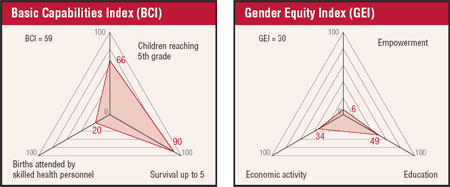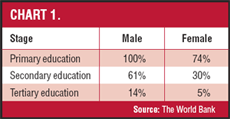Oil is not enough
Oil is not enough
Human Rights Information and Training Centre (HRITC)
Social Democratic Forum
Yemeni Observatory for Human Rights
With an economy dependent on oil exports and reserves, which are beginning to show signs of depletion, Yemen is betting on the international price of crude going up in order to finance its budget. The country is one of the most backward in terms of development, but official socialpolicies are not based on serious economic studies and their application is increasingly chaotic. A corrupt minority makes use of the State’s resources and wealth, which do not reach the needier sectors of the population.
 |
The Republic of Yemen’s Constitution considers shar’ia, the Muslim code of behaviour and morality, to be the main source of legislation and it establishes the separation of powers – Legislative, Executive and Judicial – as well as the multi-party principle. Parliamentary elections are held every six years and local elections every four years. However, both the decentralization of government and the separation of powers are insufficiently applied.
Islam is the state religion and Muslims are composed mainly of Shafi’i and Zaidi, although there is an Ishmaelite minority. There is also a small population of Jews, principally in the districts of Amran and Saadah. All enjoy freedom of worship. Yemeni society is primarily agricultural and governed by traditional customs in most regions.
The Constitution insists on the principle of equality among all citizens and the law is considered positive in this respect – except for a group of laws that clearly discriminate against women, such as those on personal assets and sanctions. Moreover, the application of the law constitutes a problem due to the lack of real autonomy of the judicial bodies.
Civil and political rights
During 2008, the country was severely criticized by international human rights organizations, particularly those concerned with freedom of opinion and expression. Partisan newspapers such as Atauri (The Revolutionary) and Al-Uahdaui (The Unionist), or independent ones such as the daily Al Aiám (Days) published in Aden, are facing a series of charges, which activists see as a continuous and premeditated assault on these freedoms.
Transparency International reports have indicated a clear decline in the struggle against corruption, in spite of the country ratifying the United Nations convention on this issue1 in 2005 and setting up the Supreme National Authority for Combating Corruption in 2007. Civil society works in close cooperation with the official government organization in order to raise awareness about the dangers of corruption, the need for social control over use of the general budget and the strengthening of transparency and integrity.
Despite some significant progress in ensuring free elections, both in parliamentary elections in 1993, 1997 and 2001 and in direct municipal and presidential elections in 2006, conflict between the ruling party and the opposition has resulted in a two-year postponement of the elections that should have been held in April 2009.
Economic and social situation
Yemen’s economy has been weak since the Republic was instituted in 1990. Since then, the country has undergone successive economic crises – from the Gulf War in 1991, which caused the return of migrants from Saudi Arabia and the Gulf area who had been the main source of foreign currency inflow, to the Saadah conflict2 in the north, which was still active in 2008.
The rial, the official currency, is undergoing a decrease in purchasing power due to the weakening of the economy. While in the early 1990s one U.S. dollar was worth about 20 rial, it is now worth 200 rial.
In 2007, the rise in the price of oil resulted in increased government income. However, the fall of international prices from mid-2008 has had a negative impact on the economy. This will be a severe blow since the country did not save while it was able to do so. The Government has announced a 50% reduction of expenditure in construction and infrastructure, which will have serious effects on services as well as on national and individual income in 2009. The state budget is dependent on oil extraction, and the possible depletion of the country’s reserves, whose yield is in continuous decline – from 420,000 barrels a day in 2005 to under 350,000 at present – puts it at risk. Yemen, therefore, can only hope for the international prices of crude oil to go up.
Crops of khat – a stimulating and energizing plant considered to be an economic plague since it squanders over 20 million labour hours a day – take up over half the cultivated land and use up vast quantities of subterranean water, as well as a quarter of the labour force. It is estimated that this costs USD 7 million a day.
These reasons, among others, explain why 42% of Yemenis live below the poverty line, according to 2006 food programme estimates. It is expected that this percentage will continue to increase as the price of food – especially wheat – rises in 2009. In 2007 average annual per capita income was USD 930. Economic growth decreased from 5.6% in 2005 to 3.6% in 2007, according to a government report. The World Bank estimates the unemployment rate among persons of working age to be over 35%; the Government speaks of 17%.
Yemen has one of the worst development indices in the world, ranking 157th of 175 countries in the 2007 Human Development Report, and 131st in the Transparency International report of the same year.3
The effect of trade agreements
Yemen followed the prescriptions of the IMF and World Bank and completely liberalized its trade in 1985. Reducing tariffs between 5% and 25% made the production of many local food products unviable. Food imports currently represent 33% of total imports and are a heavy load on the balance of trade and the balance of payments.
National industry is weak and private investment is falling steadily. The average increase in inflation of close to 17% in 2006, according to Government estimates, has led to a regression in living standards and in income levels and has aggravated poverty and unemployment. This is the context in which Yemen aspires to join the World Trade Organization, which continues to consider the country unqualified for membership.
The great gender gap
The general participation of women, who constitute 25.7% of the labour force, continues to drop significantly. The education gap is considerable; at 65%, female illiteracy is among the highest in developing countries. The following table shows the gender gap in education, according to 2005 statistics.
 |
With regard to health, statistics show that 366 out of every 100,000 women who are pregnant or give birth die from complications and the lack of health care. Some 55%, mainly in the rural areas, receive no care at all during pregnancy and labour.
Despite the growth of women’s political participation as voters (they represent over 42% of the electorate), their participation as candidates and winners of parliamentary and local elections is a mere 0.5%.
Although Yemen has ratified the Convention on the Elimination of All Forms of Discrimination against Women (CEDAW), the gender gap remains wide and several laws that discriminate against women remain in force. Many civil society organizations, public figures and other leaders make considerable efforts to raise awareness and promote real change, such as the adoption of the quota principle in elections and nominations.
The enjoyment of social rights
Education. The rate of access to basic education for children of school age is estimated to be barely 56.6%. This means that 2.9 million children of that age are left out of the educational system, of whom 1.9 million are girls. According to the third national Human Development Report, the internal efficiency of the education system is very low. Repetition and dropout rates are on the increase, the compulsory school timetable quota is not fulfilled, and there is an acute shortage of teachers in rural schools. Teaching and practice are inadequate and are not complemented by modern educational methods that take into account the needs of the labour market. The Report concludes that current methods and styles of teaching do not stimulate development or critical thought.
Health. Yemen’s health services are unable to keep up with growing needs resulting from demographic growth after a decline in the use of family planning. Health facilities are poorly distributed, equipment is inadequate, and human resource management is inadequate with regard to the training and qualifications of workers. In addition, the health environment is fragile and sanitary awareness is diminishing. Although rural inhabitants make up 75% of the population, their health coverage does not exceed 30% and no more than 3.5–4% of the general state budget is devoted to rural health. A World Health Organization report shows that 60% of the population lives in regions exposed to malaria, and it is estimated that 3 million people a year contract the disease. According to a report drafted by a Parliamentary Committee on water and the environment, around 12 million people suffer illnesses related to water pollution.
Labour. The Constitution, as well as various labour and civil service laws, undertakes to fulfil international conventions with regard to every citizen’s right to work and to a decent standard of living by means of a fair wage. However, Government actions in the last few years show that these commitments are being ignored. The social security system covers governmental employees and 70,000 workers in the private sector, which means that over 4 million workers are left out. At present, there is no health insurance system. Of the many children who are outside the educational system, most help their parents in farming and shepherding activities, some resort to begging and still others are taken illegally to neighbouring countries in order to beg or engage in domestic work.
Civil society and human rights
There are some 6,000 registered civil society organizations. Over 75% are of a charitable nature and distribute aid to poor families as well as offering a variety of services. Organizations with an interest in human rights are few and lack specialization; the same organization may be active in the rights of women or children, or in civil, political and economic rights. They have, however, managed to organize a variety of training cycles, conferences and other activities. The movement has been influential in getting the State to discuss a number of issues. Although there have been no major changes, there have been some gradual improvements with regard to issues pertaining to women, children and people with disabilities, and it has been possible to enact several laws related to transparency and the fight against corruption.
A number of alliances and networks have recently developed that aim to engage in activism and lobbying in several different fields: political and civil, social, economic and intellectual.


